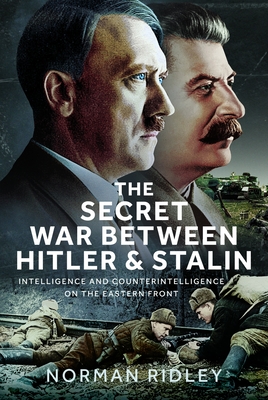The Secret War Between Hitler and Stalin: Intelligence and Counterintelligence on the Eastern Front

The Secret War Between Hitler and Stalin: Intelligence and Counterintelligence on the Eastern Front
The intelligence war between Germany and the Soviet Union, ignited by Operation Barbarossa on 22 June 1941, was fiercely contested over four years. Neither side was prepared for the scale of the conflict, and both quickly developed methods to assess and counter each other's military intentions.
This book explores the intelligence strategies of Stalin's SMERSH and Hitler's Abwehr. SMERSH coordinated three independent counter-intelligence agencies within the Red Army, while the Abwehr was Germany's military-intelligence service. Focusing on key battles like Stalingrad and Kursk, the book examines how both sides competed for intelligence advantage.
The Soviets excelled in strategic deception, manipulating German decision-making. Early in the war, they used counterintelligence to deceive the Germans, notably during their surprise counteroffensive at Moscow in December 1941 and their hidden tank formations in 1942. German intelligence chief Gehlen underestimated Soviet deception and overestimated German superiority, which hindered effective analysis.
Meanwhile, the Soviets deployed agents behind German lines and employed terror tactics to destroy German operations. The pivotal battle of Stalingrad revealed the Germans' intelligence failures, and their subsequent losses marked a turning point. By the war's end, Soviet counterintelligence had become a critical weapon, reshaping the intelligence landscape and significantly impacting the outcome of the war.
PRP: 180.00 Lei
Acesta este Pretul Recomandat de Producator. Pretul de vanzare al produsului este afisat mai jos.
162.00Lei
162.00Lei
180.00 LeiLivrare in 2-4 saptamani
Descrierea produsului
The intelligence war between Germany and the Soviet Union, ignited by Operation Barbarossa on 22 June 1941, was fiercely contested over four years. Neither side was prepared for the scale of the conflict, and both quickly developed methods to assess and counter each other's military intentions.
This book explores the intelligence strategies of Stalin's SMERSH and Hitler's Abwehr. SMERSH coordinated three independent counter-intelligence agencies within the Red Army, while the Abwehr was Germany's military-intelligence service. Focusing on key battles like Stalingrad and Kursk, the book examines how both sides competed for intelligence advantage.
The Soviets excelled in strategic deception, manipulating German decision-making. Early in the war, they used counterintelligence to deceive the Germans, notably during their surprise counteroffensive at Moscow in December 1941 and their hidden tank formations in 1942. German intelligence chief Gehlen underestimated Soviet deception and overestimated German superiority, which hindered effective analysis.
Meanwhile, the Soviets deployed agents behind German lines and employed terror tactics to destroy German operations. The pivotal battle of Stalingrad revealed the Germans' intelligence failures, and their subsequent losses marked a turning point. By the war's end, Soviet counterintelligence had become a critical weapon, reshaping the intelligence landscape and significantly impacting the outcome of the war.
Detaliile produsului









